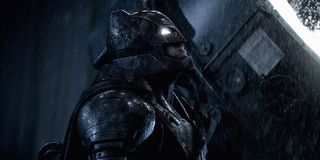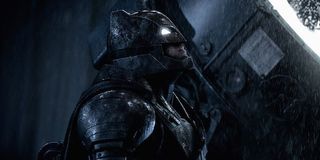Why Batman Kills People In Batman v Superman: Dawn of Justice

SPOILER WARNING: The following article contains minor spoilers for Batman v Superman: Dawn of Justice. If you haven’t seen the film yet, and don’t wish for any of the elements to be ruined, please click away to another one of our wonderful articles.
There are many differences between Christian Bale and Ben Affleck’s versions of Batman – from their personal histories to their costumes – but perhaps the most significant change is the fact that the Batman v Superman: Dawn of Justice version of the Caped Crusader seemingly has no problem taking lives. Over the course of the Zack Snyder film, the costumed vigilante is seen both running criminals over with his car and shooting them with various weapons. Not only is this a big change from Christopher Nolan’s movies, but also years and years of DC Comics – so why was the change made? According to producer Charles Roven, it’s a result of Bruce Wayne having been Batman for just a bit too long.

I had the wonderful opportunity to sit down one-on-one with Roven at the junket for Batman v Superman: Dawn of Justice earlier this month, and while we touched on many subjects in our conversation, one particular element I was curious about the decision to have Ben Affleck’s version of the Dark Knight willingly take lives. The filmmaker explained that Batman’s willingness to take lives is a result of the amount of pain, loss and exhaustion he’s experienced during his time protecting the streets of Gotham. Said Roven,
I think that it just came about that this particular Batman, he’s been jaded by the process. There’s a really amazing line in the movie, ‘20 years in Gotham, how many good guys are left? How many stayed that way?’ And let’s face it, he’s a very damaged guy... We see Robin is not around. The character has evolved, and he’s definitely a more brutal guy, and we wanted him to be right on that edge, right on that razor. And he has to be on the razor’s edge, or why would he get Superman’s attention?
This explanation does leave the door open for the idea that Batman in his younger years actually didn’t kill his enemies. It’s entirely possible that it wasn’t until The Joker killed Robin (who may or may not be Jason Todd) that Bruce Wayne totally snapped and decided that he was better off putting his enemies in the ground instead of Blackgate Penitentiary/Arkham Asylum.
Charles Roven went on to explain that Batman killing people will present a challenge to the audience in terms of whether or not we should actually like him – though he believes that’s part of what makes him such an interesting protagonist. Said the producer,
So we felt that that was good, and also we felt that he’s a guy that you still would understand, because you admire him, but you also feel bad for him. He’s a compelling character. You want to spend time with him. You may not want him as your best friend.
In the Dark Knight’s 77 years of existence, there is precedent of the character killing his enemies, but it does pose an interesting question for the DC Cinematic Universe going forward: if this version of Batman is willing to terminate his enemies, why is The Joker still alive? Or any members of the Suicide Squad for that matter? It’s a question that we may very well get an answer to later this summer.
CINEMABLEND NEWSLETTER
Your Daily Blend of Entertainment News

Eric Eisenberg is the Assistant Managing Editor at CinemaBlend. After graduating Boston University and earning a bachelor’s degree in journalism, he took a part-time job as a staff writer for CinemaBlend, and after six months was offered the opportunity to move to Los Angeles and take on a newly created West Coast Editor position. Over a decade later, he's continuing to advance his interests and expertise. In addition to conducting filmmaker interviews and contributing to the news and feature content of the site, Eric also oversees the Movie Reviews section, writes the the weekend box office report (published Sundays), and is the site's resident Stephen King expert. He has two King-related columns.
Most Popular






